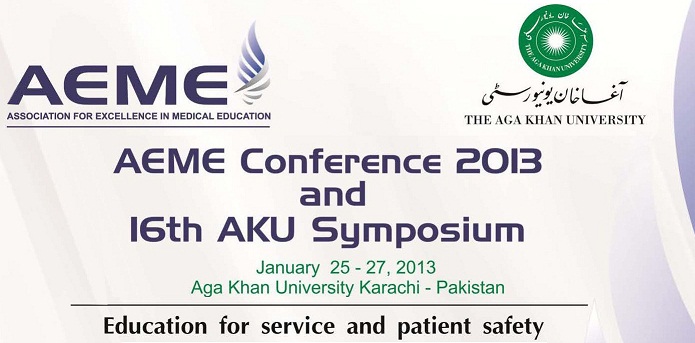Day 1 : Oral Presentations (Theme: Patient Safety)
Assessment of the level of knowledge and the perceived consequences of medical negligence among fresh medical graduates of a private medical university in Karachi, Pakistan
Location
Lecture Hall 2
Start Date
26-1-2013 11:40 AM
Abstract
Background: Medical negligence is the one of the leading cause of death in developing countries and as well in developed countries. The incidence of medical negligence cannot be established in Pakistan mainly due to lack of data availability and no accredited system of reporting by the government and medical licensing body. Increasing number of cases of negligence enforced us to think about the revisions in medical curriculum.
Methods: A cross sectional study was conducted during July-August 2011 in a private medical university of Karachi. A 30 itemed self-administered questionnaire was developed which was filled by a total of 200 medical graduates upon their consent. The collected data was analyzed using SPSS version 10.0.
Results: Our results of the study showed that 62% of the participants blame doctors for the act of medical negligence and 87.5% reported that medical negligence affect their career, their image being a doctor and future scope in this profession. 82.5% participants had strongly recommended including medical ethics as a separate subject in the medical curriculum.
Conclusions: Medical graduates are stressed due to the increased number of reported cases of medical negligence. This is high time for the government to enforce policy implementation to reduce medical negligence and for the implementing bodies and medical education departments of medical colleges to understand the need of revision of medical curricula. Continued follow-up of this study could provide information to inform further curriculum development and, if appropriate, aid in the design of training programs for the prevention of medical negligence.
Key words: medical negligence, curriculum, medical graduates and medical ethics
Assessment of the level of knowledge and the perceived consequences of medical negligence among fresh medical graduates of a private medical university in Karachi, Pakistan
Lecture Hall 2
Background: Medical negligence is the one of the leading cause of death in developing countries and as well in developed countries. The incidence of medical negligence cannot be established in Pakistan mainly due to lack of data availability and no accredited system of reporting by the government and medical licensing body. Increasing number of cases of negligence enforced us to think about the revisions in medical curriculum.
Methods: A cross sectional study was conducted during July-August 2011 in a private medical university of Karachi. A 30 itemed self-administered questionnaire was developed which was filled by a total of 200 medical graduates upon their consent. The collected data was analyzed using SPSS version 10.0.
Results: Our results of the study showed that 62% of the participants blame doctors for the act of medical negligence and 87.5% reported that medical negligence affect their career, their image being a doctor and future scope in this profession. 82.5% participants had strongly recommended including medical ethics as a separate subject in the medical curriculum.
Conclusions: Medical graduates are stressed due to the increased number of reported cases of medical negligence. This is high time for the government to enforce policy implementation to reduce medical negligence and for the implementing bodies and medical education departments of medical colleges to understand the need of revision of medical curricula. Continued follow-up of this study could provide information to inform further curriculum development and, if appropriate, aid in the design of training programs for the prevention of medical negligence.
Key words: medical negligence, curriculum, medical graduates and medical ethics

